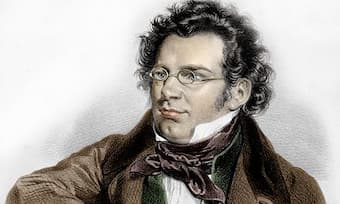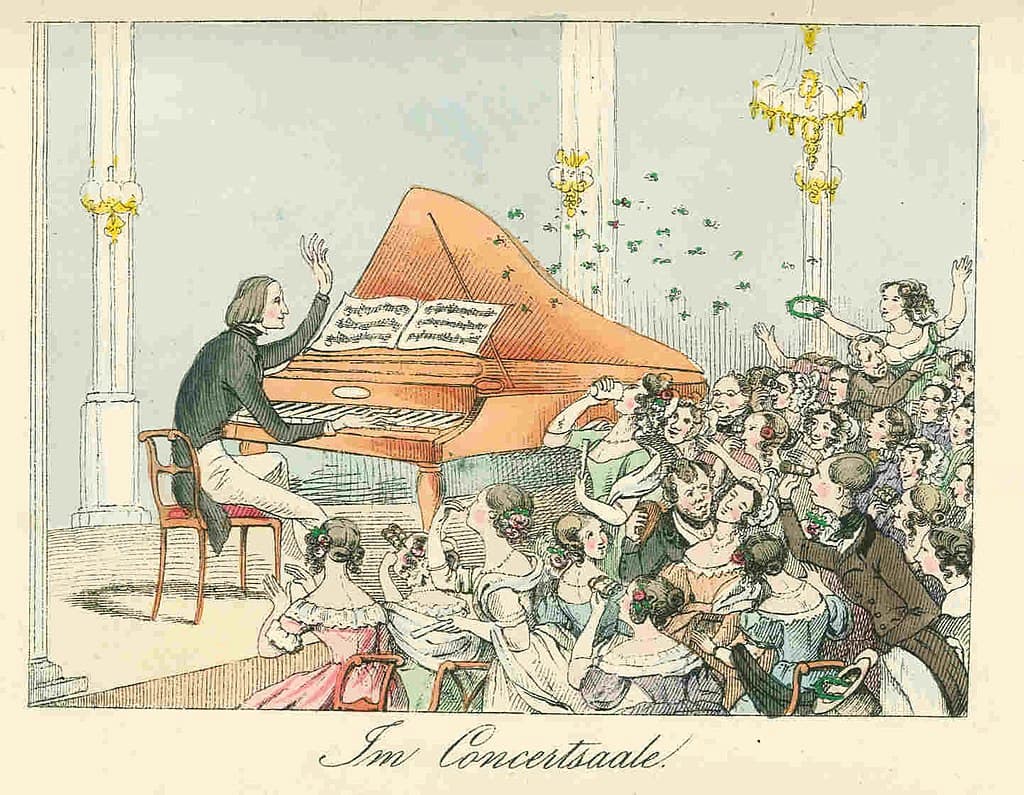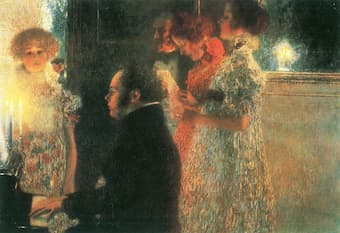Let’s continue to explore more re-arrangements of Schubert’s Winterreise. With Song 13, the village of disappointment is left behind, and our narrator sets his face on the road. But, inevitably, there are things that call his mind back. Just as he leaves town, he hears a familiar sound – the post! Once it would have brought him a letter, but now there’s nothing for him except memories.

Franz Schubert
Franz Schubert: Winterreise, Op. 89, D. 911 – No. 13. Die Post (arr. for horn and piano) (Richard King, horn; Susan Teicher, piano)
Left in the snow, our hero discovers his black hair rapidly greying as the snow falls on it. Aging before our eyes, our hero is left pensive, thinking of age and loss. This setting for voice, accordion, and wind quintet becomes a thought piece, rather different from the other songs where our hero rails against his fate.
Franz Schubert: Winterreise, Op. 89, D. 911) – No. 14. Der greise Kopf (arr. N. Forget for voice and accordion (Christoph Prégardien, tenor; Joseph Petric, accordion; Pentaèdre)
Almost in a jazz idiom for voice and string quartet and not sung in German but in Catalan, this arrangement takes us from an art song to more of a folk song. The crow is a symbol of life, or is it waiting for his death?
Franz Schubert: Winterreise, Op. 89, D. 911 (Sung in Catalan) – No. 15. Die Krahe (arr. A. Puig, P. Bartolome, I. Lluch and Q. Puges for voice and string quartet) (Judit Neddermann, vocals; Brossa Quartet de Corda)
Arranged for solo piano, the performer is making, as the album title says, a Journey for One, creating a fantasia on Schubert’s original.
Franz Schubert: Winterreise, Op. 89, D. 911 – No. 16. Letzte Hoffnung (arr. H. Demske for piano) (Hilary Demske, piano)
One arranger who we’ve ignored so far has been Liszt. Liszt took half the songs from Winterreise and made his own arrangements, blending, as one writer said, ‘Classical inspiration with Romantic virtuosity’. If Schubert’s skill was the lyricism and emotional intensity of his settings, Liszt’s contribution was to make them virtuosic pieces for solo piano.

Caricature of Liszt in the concert hall
Franz Liszt: Schubert – Winterreise, S561/R246 – No. 11. Der stürmische Morgen – No. 12. Im Dorfe (Antti-Siirala, piano)
The addition of the English horn brings an urgency to the poet’s description of the changing weather – storm clouds torn apart by the wind, the red flames of a sunrise, and the winter remains cold and savage.
Franz Schubert: Winterreise, Op. 89, D. 911 – No. 18. Der stürmische Morgen (arr. E. Wesly for voice, cor anglais and string trio) (Florian Götz, baritone; Quartet Grundman)
Täuschung (Deception) is where our desperate hero fools himself – he sees a light before him, it must be friendly, pointing him to a warm house away from this horror of cold and night he’s suffering through. And there must be a loving heart in that house…but it’s all an illusion, fooling himself into a false happiness.
Franz Schubert: Journey for One: Winterreise, Op. 89, D. 911 – No. 19 Täuschung (arr. H. Demske for piano) (Hilary Demske, piano)
Der Wegweiser (The Signpost), in this setting for string quartet, captures the loneliness of his decision to go down the road from which no one has ever returned, ignoring the signs for town and people and heading instead for the wastelands.
Franz Schubert: Winterreise, Op. 89, D. 911 – No. 20. Der Wegweiser – Intermezzo VIII (arr. A. Höricht for string quartet) (Voyager Quartet)
Das Wirtshaus (The Inn), where his lonesome path has taken him to a graveyard. There’s no room at this Inn, but every ‘door’ is decorated by a green wreath – a green ‘death-wreath’ – there’s no innkeeper to welcome him, so he walks on.
Franz Schubert: Winterreise, Op. 89, D. 911 – No. 21. Das Wirtshaus (arr. N. Forget for voice and accordion) (Christoph Prégardien, tenor Joseph Petric, accordion; Pentaèdre)

Klimt: Schubert at the Piano II
A trombone – just the thing for courage. Courage to push on, to find a new life.
Franz Schubert: Winterreise, Op. 89, D. 911 (arr. M. Gee for trombone and piano) – No. 22. Mut (Courage) (Matthew Gee, trombone; Christopher Glynn, piano)
Die Nebensonnen (The Phantom Suns). In his misery, he sees three suns where there should be one, all perfectly aligned across the horizon. But they are not his suns, they are for others – he will even, with sunset, let his sun go.
Franz Schubert: Winterreise, Op. 89, D. 911 – No. 23. Die Nebensonnen (Mitsuko Shirai, soprano; Hartmut Höll, piano)
The Bosnian singer and actress Nataša Mirković-De Ro brings not only drama to the final song but also a hurdy-gurdy!
Franz Schubert: Winterreise, Op. 89, D. 911 – No. 24. Der Leiermann (arr. M. Loibner for voice and hurdy-gurdy) (Nataša Mirković, vocals; Matthias Loibner, hurdy-gurdy)
At the end of the song cycle, we don’t know if our hero will make yet another wrong choice in following the crazed hurdy-gurdy man – or has this all been a bit of Romantic era suffering?
The process of making an arrangement is like the process of translating – something has to change for the new idiom. Sometimes, contrapuntal lines are obscured, and in other cases, they’re brought to the fore. Other lines to fill in the implied harmonies might have to be supplied. As each arranger approached Schubert’s original, s/he had to delve deep into not only Schubert’s psyche but also Wilhelm Müller’s to find out how to answer the questions an arrangement might raise. At the same time, there’s a certain pragmaticism about it all – I want to play this great work by Schubert, but all I have is an oboe and a bassoon, what can I do to bring home Schubert’s inspiration?
For more of the best in classical music, sign up for our E-Newsletter


